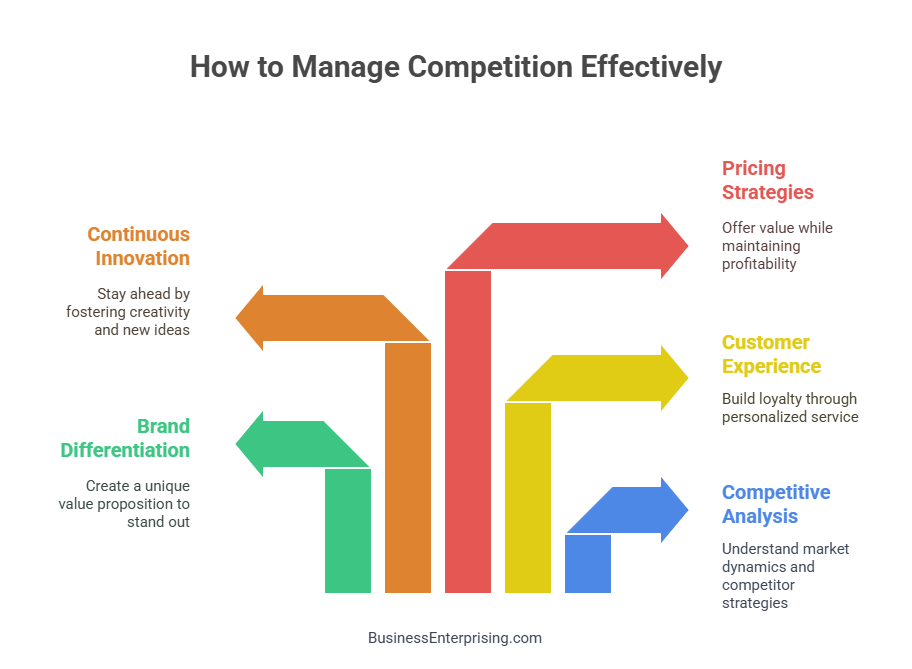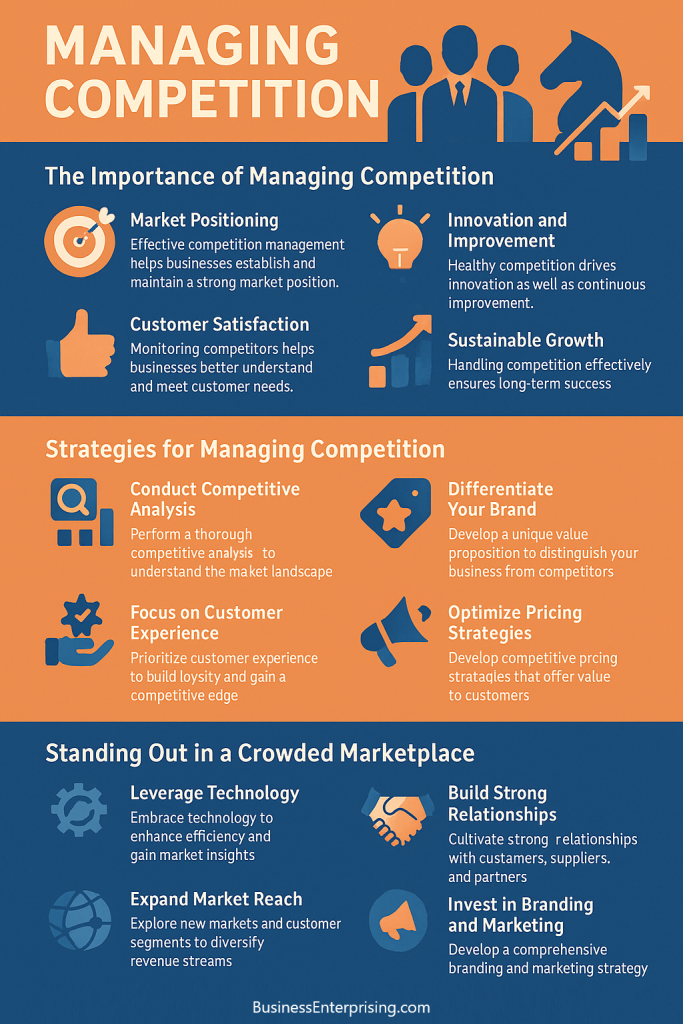 In any dynamic and ever-evolving market, competition is inevitable. For businesses, managing competition effectively is crucial for survival and growth. Understanding competitive dynamics, staying ahead of rivals, and continuously adapting to market changes are essential to gaining a competitive edge.
In any dynamic and ever-evolving market, competition is inevitable. For businesses, managing competition effectively is crucial for survival and growth. Understanding competitive dynamics, staying ahead of rivals, and continuously adapting to market changes are essential to gaining a competitive edge.
The Importance of Managing Competition
Market Positioning: Effective competition management helps businesses establish and maintain a strong market position. Understanding competitors’ strengths and weaknesses also allows companies to strategically position themselves to attract and retain customers.
Innovation and Improvement: In addition, healthy competition drives innovation as well as continuous improvement. Businesses are motivated to develop new products, improve services, and enhance customer experiences to stay ahead of competitors.
Customer Satisfaction: By closely monitoring competitors, businesses can better understand customer preferences and market trends. This insight enables them to offer superior products and services that meet or exceed customer expectations.
Sustainable Growth: Handling competition effectively ensures sustainable growth. Businesses that adapt to competitive pressures and capitalize on market opportunities can achieve long-term success and profitability.
Strategies for Managing Competition
Conduct Competitive Analysis:
To begin with, conduct a thorough competitive analysis to gain a comprehensive understanding of the market landscape. Next, identify your key competitors and carefully analyze their strengths and weaknesses. In addition, assess their market positioning to determine where your business stands relative to theirs. Moreover, tools like SWOT analysis (i.e., Strengths, Weaknesses, Opportunities, Threats) can offer valuable insights into competitive dynamics and help guide strategic decisions.
Differentiate Your Brand:
Equally important, brand differentiation plays a vital role in standing out in a crowded market. Therefore, develop a unique value proposition that clearly communicates what sets your business apart from competitors. Furthermore, focus on delivering distinctive benefits, whether it’s superior quality, exceptional customer service, or innovative solutions. As a result, your business will be more appealing to your target audience and harder for competitors to replicate.
Focus on Customer Experience:
In today’s competitive environment, prioritizing customer experience is essential for building loyalty and gaining a sustainable edge. Consequently, invest in understanding customer needs, preferences, and pain points through research and feedback. Then, use those insights to provide personalized, high-quality experiences that not only meet but exceed expectations. After all, satisfied customers are far more likely to become repeat buyers and brand advocates, contributing to long-term success.
Innovate Continuously:
Additionally, continuous innovation is crucial for staying ahead of the competition. To foster innovation, create a culture that encourages creativity and experimentation at every level of your organization. Encourage team members to share new ideas and explore emerging technologies. Furthermore, make it a priority to regularly update and improve your products and services so they align with evolving market demands.
Optimize Pricing Strategies:
Finally, develop pricing strategies that strike a balance between delivering customer value and maintaining profitability. Take into account key factors such as cost structure, perceived value, competitor pricing, and current market conditions. Moreover, implement pricing tactics like discounts, product bundles, and loyalty programs to attract new customers and strengthen retention. Over time, a well-optimized pricing strategy can significantly enhance your competitive position.
Standing Out in a Crowded Marketplace
Leverage Technology:
To begin with, embrace technology as a powerful tool to enhance efficiency, improve customer experiences, and gain valuable insights into market trends. In particular, investing in advanced analytics, automation, and digital marketing tools can significantly streamline operations. As a result, your business will be better positioned to make timely, data-driven decisions and maintain a competitive edge.
Build Strong Relationships:
In addition to leveraging technology, it is equally important to cultivate strong relationships with customers, suppliers, and partners. Indeed, these relationships foster long-term loyalty and can serve as a strategic advantage in a competitive marketplace. Therefore, engage with customers across multiple channels, actively seek their feedback, and implement their suggestions. In doing so, you strengthen trust and reinforce their connection to your brand.
Expand Market Reach:
Moreover, expanding your market reach allows you to diversify revenue streams and reduce dependence on a single market segment. Start by conducting thorough market research to uncover new opportunities for growth. Then, tailor your products and marketing efforts to meet the specific needs and preferences of these emerging markets. Consequently, this strategic expansion can fuel long-term business growth.
Invest in Branding and Marketing:
Alongside market expansion, it is essential to invest in building a strong and consistent brand identity that resonates with your target audience. Additionally, develop a well-rounded marketing strategy that integrates digital marketing, social media, content creation, and public relations. Altogether, these efforts help differentiate your business, build credibility, and attract new customers.
Monitor and Adapt:
Finally, in an ever-changing business environment, it is critical to continuously monitor the competitive landscape and shifting market trends. Stay informed about industry developments, customer behaviors, and competitor strategies. Furthermore, maintain agility by regularly evaluating and adapting your approach. This proactive mindset ensures your business remains resilient and responsive to emerging opportunities and challenges.
Case Studies: Successful Competition Management
Apple Inc.: Apple has consistently managed competition through innovation and brand differentiation. By focusing on sleek design, user-friendly interfaces, and a robust ecosystem of products and services, Apple has maintained a loyal customer base and a strong market position.
Netflix: Netflix effectively navigated competition by embracing technology and innovation. Transitioning from DVD rentals to a streaming service, Netflix invested in original content production, personalization algorithms, and global expansion, securing a dominant position in the entertainment industry.
Starbucks: Starbucks differentiates itself through exceptional customer experience and brand loyalty. By offering personalized service, a cozy ambiance, and high-quality products, Starbucks has created a loyal customer base and successfully managed competition from other coffee chains.
Managing competition is a critical aspect of business success. By conducting competitive analysis, differentiating your brand, focusing on customer experience, and continuously innovating, businesses can navigate competitive pressures and achieve sustainable growth. Leveraging technology, building strong relationships, expanding market reach, and investing in branding and marketing further enhance a company’s ability to stay ahead of rivals.
In today’s fast-paced and competitive market, businesses must remain vigilant and adaptable. By implementing these strategies and continuously monitoring the competitive landscape, businesses can not only survive but thrive, securing long-term success and profitability. Mastering the art of competition management is essential for any business aiming to achieve and sustain a leading position in their industry.





